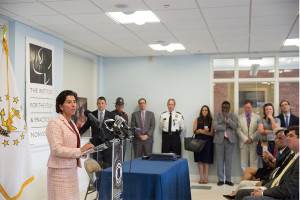Second Chance Month Q&A: Rhode Island Governor Gina Raimondo
By CSG Justice Center Staff
 Gov. Raimondo signs Justice Reinvestment legislation in 2017, which prompted an overhaul of Rhode Island's criminal justice system.
Gov. Raimondo signs Justice Reinvestment legislation in 2017, which prompted an overhaul of Rhode Island's criminal justice system.
This Second Chance Month, The Council of State Governments Justice Center staff asked governors from states across the country why reentry is important to them and the communities they govern. Below, find Rhode Island Governor Gina Raimondo’s reasons why #ReentryMatters.
What does reentry mean to you?
I believe that reentry needs to be a community-centered approach that supports individuals as they get back on their feet. It requires government and community organizations to come together and help people get on the right track—and stay there.
In the past decade, what progress have you seen in your state regarding reentry?
In my first term, we passed a series of criminal justice reform initiatives called Justice Reinvestment. In the years since that legislation passed, I formed the Governor’s Justice Reinvestment Executive Oversight Council to help implement the goals of that legislation, which were to improve our criminal justice system and promote rehabilitation and informed decision making. Specifically, the council focuses on discharge planning for incarcerated individuals, expanding the use of risk assessments for probation, and helping reduce probationary terms for those with lengthy probation sentences.
Our Department of Labor and Training also runs programs designed to support reentry. The Amos House/Open Doors reentry programs bring together two impactful community agencies to focus on helping people leaving incarceration obtain employment and reenter society. The Man Up program provides comprehensive services including discharge planning, case management, and career counseling.
What issue—or issues—related to reentry do you want to address in your state in 2019?
Supporting reentry is critical and I’m proud of what we’ve accomplished, but there’s always more work to do. Right now, we’re working on identifying immediate next steps. I hope to announce expanded efforts to support reentry within the next few months.
Why should an average citizen in your state, not necessarily connected to any part of the criminal justice system, care about reentry?
We all benefit when individuals leaving prison have a place to live, a chance at higher education, and a good job. Studies show that having a clear pathway to reenter society reduces recidivism. It’s good for all our citizens—and our taxpayers—if people leaving incarceration become productive members of society. It drives down the future cost of corrections, reduces the crime rate, improves public safety, and helps grow our economy.
If you could say something directly to a person on the verge of leaving prison or jail and reentering society, what would you tell them?
The biggest thing I would say is, “We want you to succeed.” Too often, there’s a sense of isolation that hinders individuals coming out of our criminal justice system. It’s important to me that people reentering society know that we want to support them and help keep them on the right path.



